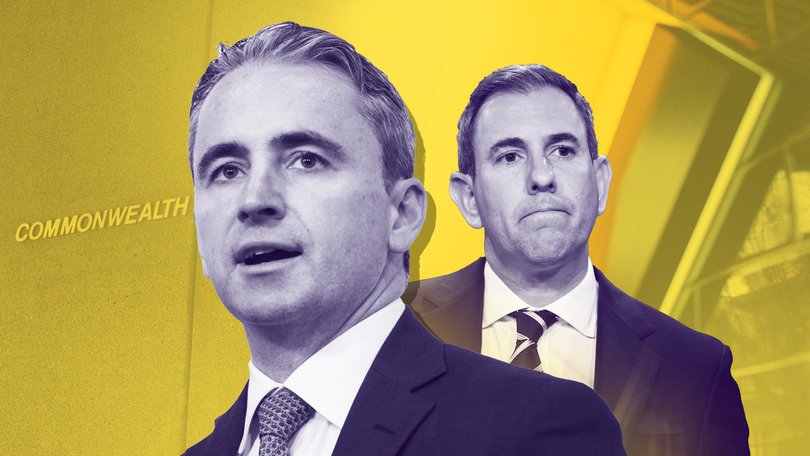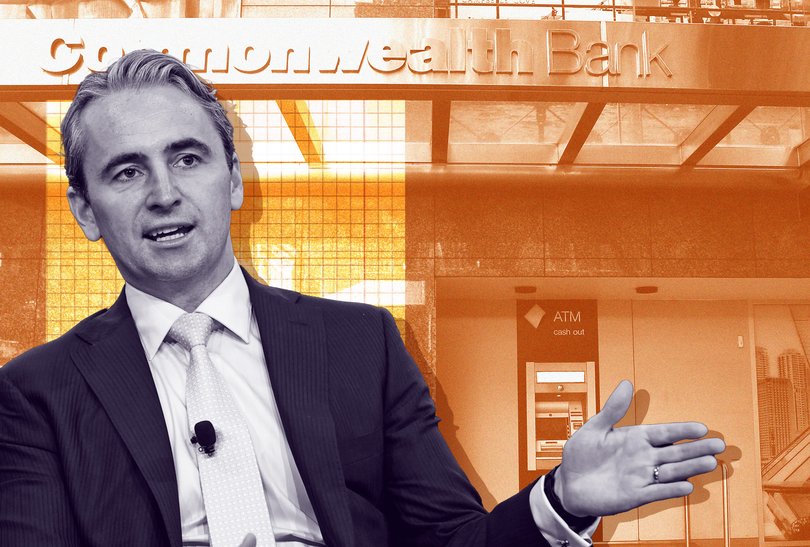JACKSON HEWETT: Comm Bank chief Matt Comyn warns against cutting corporate tax rate
JACKSON HEWETT: The head of Australia’s largest bank says he welcomes tax reform but doesn’t believe a cut to the corporate tax rate is necessary to kick start lagging business investment.

The head of Australia’s largest bank says he welcomes tax reform but doesn’t believe a cut to the corporate tax rate is necessary to kick start lagging business investment.
That puts Commonwealth Bank chief executive Matt Comyn at odds with peak business groups who advocated for a 5 per cent cut in the corporate tax rate to 25 per cent ahead of Albanese Government’s productivity roundtable.
“Personally, I wouldn’t make changes around the corporate tax,” Mr Comyn said.
Sign up to The Nightly's newsletters.
Get the first look at the digital newspaper, curated daily stories and breaking headlines delivered to your inbox.
By continuing you agree to our Terms and Privacy Policy.“Obviously it would be in CBA’s interests, but I think there are higher priorities.”
Mr Comyn said the priority should be simplifying the tax system, re-balancing the burden away from labour, and boosting support for small business and innovation.
“If you were going to look at the tax rate, look at smaller businesses. I think there’s also scope to improve incentives for research and development,” he said, noting the transformational changes coming with the widespread adoption of artificial intelligence.
Mr Comyn said he was it was encouraging the Government had shifted its focus to growth and long-term reform, now that inflation had moderated, and urged business leaders to support difficult policy change.
“Part of the role of business leaders is to advocate for sensible long-term reforms,” he said.
“We should be encouraging the Government and hopefully making it easier for them to bring those reforms through, because change isn’t easy.”
While he had not yet received a formal invitation to the Government’s productivity round table in August, Mr Comyn said he had met with Treasurer Jim Chalmers last week and the bank had already made a submission to the Productivity Commission’s review into how to reform the country’s dire productivity figures.
Mr Comyn’s comments follow Dr Chalmers’ declaration the Government had a mandate for tax reform in the context of Budget sustainability and poor productivity.
In his address to the National Press Club Wednesday, Dr Chalmers called out a concern for “inter generational fairness” in the context of an ageing workforce under the current tax system.
Mr Comyn agreed Australia’s tax system placed too much weight on workers.
“We’ve got to look at the balance between the imposition on labour versus perhaps on wealth,” he said.
We’ve got to look at the balance between the imposition on labour versus perhaps on wealth
He said the structural pressures on the economy, including an ageing population, growing public sector demands, and geopolitical volatility meant reform was vital.
“We’ve had a pretty good run as a country, and I think we’ve benefited from a number of tailwinds. But those tailwinds are gone,” he said.
“Some of these changes won’t manifest in outcomes immediately, but if we don’t start them now, we’re going to be behind for a very long time.”

One of the issues holding back Australian productivity has been the dearth of capital investment into labour-enhancing machinery. Mr Comyn said while this remained a challenge, technology, and artificial intelligence in particular, offered a path to future gains, provided businesses and workers were equipped to adapt.
Mr Comyn said business lending had grown more than 50 per cent over the past five years—double the pace of housing—but uncertainty was holding back longer-term investment.
He said many businesses were still trying to get clarity on near-term conditions following years of disruption, including COVID, supply chain dislocation, high inflation and rapid interest rate increases. While there was a role for policy to stimulate investment, he said any incentives needed to be carefully designed, and businesses also had a responsibility to invest.
He pointed to CBA’s own capital program, which has increased by more than 11 per cent over the past year, with much of that directed toward technology investment seen as critical to the bank’s long-term competitiveness.
Mr Comyn, who last month joined a number of top CEOs at Microsoft’s annual tech showcase in Seattle, said artificial intelligence had “huge potential” to lift productivity across the economy, but its success would depend on how well organisations and their people were able to adapt to and implement the technology.
AI is likely to be a core feature of the productivity roundtable, with unions calling for the right for workers to “reject its use completely, in the public interest”.
Mr Comyn said the adoption of AI would require new skills and adaptability.
“With any new technology, there’s always uncertainty. And that’s perfectly understandable,” he said.
“Jobs will change over time (and) it’s really important we help people adapt.”
“Technology change generally is an important contributor to productivity,” he said. “It’s important we’re actively grasping the opportunity, and balancing any of the risks.”
